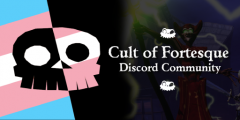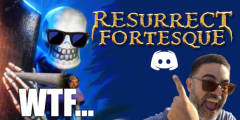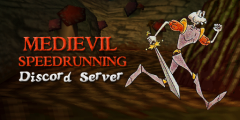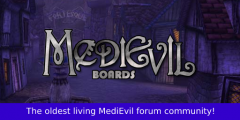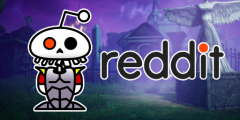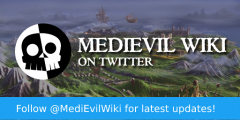atomic-city
atomic-city was Jason Wilson's personal website. It contained concept art from released and cancelled games he worked on as part of his employment at SCEE Cambridge Studio.
| atomic-city | ||
|---|---|---|
| URL | atomic-city.co.uk/ | |
| Commercial | No | |
| Language(s) | English | |
| Registration | N/A | |
| Owner(s) | Jason Wilson | |
| Status | Defunct | |
| Type | Personal | |
| Launched | 2004 | |
Content
MediEvil
Design History
Of all the games I have worked on in recent years this is the most fondly remembered by the public and the press. In interviews for other projects I am often asked about my time on Medievil, it's a nice question as Medievil was of[sic] the most satisfying game that I have worked on.
The game has a lot of my energy in a number of different areas from the game play design, art and scripting. It was an honor to have worked with such a talented but fledgling team and when I look back on all the long hours we spent making this game it is with a big smile, the thought of this game cheers me on. I would have loved to worked on one last Medievil game (but only if I was involved as I was on the first). Maybe there will be another Medievil game in the future, it would be odd to think I would not be involved but it would be interesting to see how it might turn out.
Medievil was the brain child of Chris Sorrell whom wanted to make a 3D version of the arcade classic 'Ghosts and Goblins', at the beginning I was involved only in an art capacity. We wanted the art to resemble the 'Tim Burton' movie 'The nightmare before Christmas' but for it to be more colorful. At a certain point in the projects development the game play was found to be lacking as it was just a simple run around hack and slash game, I was then charged with re-designing big elements of the game as I have a game design background. I wanted the game to resemble an adventure (of the type I love to play) with arcade elements like the SNES 'Zelda game.'
I love creating little worlds and one thing I strongly believe in from a design point of view is the power of revisiting levels to uncover secret areas and missions it also re-uses artwork and is labor saving when creating new levels and events. All the design in Medievil worked wonderfully, I was surrounded by a fantastic team and as it was our first game in total 3D there was a great feeling of pioneering, every new task we achieved on the humble Playstation was a real step for us - I still remember getting our first very basic textured landscape on the Dev-kit at about 6-00am and the excitement that caused was a magic moment that may never be repeated!
When I think back to my working methods on Medievil they were very basic (around 1995/6)! I would rough out a level on a piece of paper, the concept artwork that I would design was very basic, kind of childlike, like playschool (no photoshop). These drawing were then built in a very low polygon form in a software package called 'Nichimen.' I would then draw most of the textures in Photoshop 2, I did not even have a Wacom pen then so they were all drawn with a mouse which seems incomprehensible now!
I would map out every single variation in the attack patterns of the enemies and events, everything was mapped out before the game was programmed which really helped the game come together like a well planned jigsaw. This is the only time this has happened on a project in recent years but the way I worked on Medievil was that I not only dressed the levels in terms of art but I designed the actual terrain, I think this really shows, as the level rise and fall and the ground level is never too flat. The level terrain had a lot of interesting variety. I love going over and under areas and some of the map design in Medievil is as quirky as the characters. It's a shame I never got to work like this again as I believe I have a good eye for level design but nowadays my art jobs take up a lot of my time.
Some people (with long memories) say that Medievil took a very long time to make and yes that is true BUT the team did have to learn how to build the technology from scratch having never made a game like this before and write the code a number of abortive platforms (Saturn, PC and then finally Playstation). When the game had to re-designed I did the job very quickly - I think it only took about four months and then a few months of implementation with everyone helping out.
Not only did I serve as Lead artist and Lead designer on Medievil but I also got to write the preliminary script for Sir Dan's bumbling journey across Gallowmere. This was great fun working with INSERT NAME[sic], coming up with as many innuendoes and camp moments as we could get away with. It's not surprising that the main bad guy Zarok turned out to be the campest video game villain (at least that I know of!) but people really liked this humor and it think it made us different from a lot of games. I got to direct the voice over actors (as I have experience in directing voice over work), I got to work with one of my childhood heroes 'Paul Darrow' of (BBC) Blakes 7 fame. He was a real joy to work with (and I believe he was used on another of the Cambridge Studios games 'Primal'), very friendly and extremely interesting in the game itself. It was a bit of buzz for my inner child and at the end of the recording session I politely asked Mr Darrow to sign his recording script, it's little things like this which make the job very worthwhile.
Medievil went on to be a big success for the fledgling Sony Cambridge Studio and soon the company was to specialize in 3rd person action adventures with Medievil as the original blue print. In the days of Medievil we were not as disciplined and structured as the projects that came later but you know what, some times 'structure' can lead to too much 'beuocracy.' As good as our later games are I think they do lack that certain pioneering enthusiastic spark of that original team that made Medievil the well regarded golden oldie it is now. I'm not saying you don't need things to be structured but you do need to harness peoples creative juices and Medievil did just that.
Above is a photograph of the original Medievil team in all their motley glory, just hanging about in a graveyard in Cambridge. I think this picture was published in the 'Times business section' I cannot quite remember why it was published but it's funny to think of all those sharp suited business types catching a glimpse of these gothic geeks :) Oh in case you were wondering I am the one at the back with the long hair, we were all a bit hippy and Goth in those days but we did not take ourselves seriously and we liked to have a laugh - I am glad to say.
The above picture was created by Jason Riley who also designed the Pirate Ship level.
Concept Art
MEDIEVIL (1995-97/cartoon children fantasy)
"This is only a part of the concept work that was created for Medievil. Artwork drawn on paper."
All images and concepts are copyright Sony Computer Entertainment. All rights reserved.
Dan's Evolution
- Med1 dan earlydesign small.jpg
- Med1 dan earlydesign2 small.jpg
- Med1 dan earlydesign3 small.jpg
- Dragondan small.png
- Med japanese book.jpg
DANIEL FORTESQUE. The first concept designs for the hero of Medievil. Dan first started life as a large bulky (undead) knight with a rather small skull. As the designs evolved it was decided that Dan should have no lower jaw bone and his body became small in size and his skull more abstract. Dan was then bought to life by the animations of Mitch Phillips. The dragon character is a version of Dan after he drinks the Dragon potion. To the right is a Japanese Medievil book.
Visual Concepts
- Med1 small.jpg
- Med3 small.jpg
- Med1 graveyard small.jpg
- Med4 small.jpg
The above crayon drawings were the first conceptual visuals of how the game might appear on screen. At an early stage it was decided that the game would only have three on rail camera modes - a camera behind Dan, camera to the side of Dan (sideways scrolling) and a camera above Dan. As our technology grew we used all manner of camera angles to follow Dan throughout the game.
Art Style
Medievil art style. Visually the game Medeivil was to have been inspired by the movie 'The nightmare before Christmas', a warped gothic world (this was before anyone else had used this art style other than Mr Burton). We wanted our world to be a lot more colourful than TNBC so I spent some time creating little crayoned drawings depicting what the terrain in Medievil will look like. We wanted our worlds to be as curvy with lots of ups and downs and as wonky as possible.
Zombies
- Zombie1 coloured small.jpg
- Zombie2 coloured small.jpg
- Med14 small.jpg
- Med13 small.jpg
The land of Medievil (Gallowmere) is populated by many types of zombies. The zombies in Medievil are colourful cartoon zombies that would not be out of place in a children's horror book. The zombies were to pop out of the ground in coffins a delivery mechanism taken from the old classic arcade game, Ghosts and goblins. We had various code names for the zombies in Medievil such as 'Elvis zombie', 'golfing zombie' and 'stupid zombie.'
Graveyard Map
- Med1 hangmanshill small.jpg
- Options grave1 small.jpg
- Options grave2 small.jpg
- Gargoyles.jpg
Various designs for the graveyard options screens (the camera roves through the graves that display the player options). This was re-used for the PSP version.
Zarok
- Zarok small.jpg
- Med1 citymadness small.jpg
- Zarokslairrender.jpg
- Madness doodles small.jpg
Pictured to the left are early designs for the villain of Medievil; Zarok the sorceror[sic]. Zarok actually turned out rather camp which gave him an endearing quality as a villain and suited the quirky fun nature of Medievil. To the right are designs for the city of madness, a domain that Zarok seeks to control. 3D render of the city of madness by Jason Riley. To the far right are extracts from one of my note books.
Knights
Evil zombie knights. As the game progresses the zombies become more powerful and the player has to outwit a whole army of zombie knights from range from flying spear knights to flame throwing ghouls to the bloated fat knights that belly barge you to a watery grave in the swamps. To the right is an example of one of my animation pages that I would give to the animators as a guide line to how a character is to move.
Pumpkins
The walking pumpkin monsters. A very early level design saw Dan navigating an overgrown gorge populated by pumpkins that have been mutated by magic. I found the pumpkin monsters to be quite cute as well as menacing. The level culminated in a battle with the king of all pumpkins the Pum-king. To the right is the geometry design for the farmyard where the Pum-king rules, his roots have sucked all the moisture from the land and his pseudo-pods must be hacked away. A nice touch was the fish flapping about on the surface of the dried up ponds.
Scarecrows
The scarecrows. Animated mannequins of Zarok, these creatures would twirl and spin towards you and if this attack failed they would reach deep within their dark hearts and release evil crows to peck at Dan. The scarecrow fields level of Medievil had a nice dusty sunburnt feel to it.
Mad Village
- Mr.Mad and Mrs.Madart.jpg
- Madvillage.jpg
- Med1 madvillage2 small.jpg
- Hedge sculptures.jpg
- Med1 monks small.jpg
The populated (the living not dead) areas of Gallowmere have been tainted by the magic of Zarok causing the inhabitants to go mad, attacking Dan on sight. The village through which Dan must travel is a twisted warped place based upon a hill, I was very happy with the crazy skewed geometry we had in this level. To the right are designs for the Asylum hedge gardens, I designed a lot of riddle puzzles for this level (relayed to you by Jack of the green, I[sic] character I read about in English mythology). The riddles had physical manifestations in the form of hedge sculptures. A very nice level to have worked on.
Swamps
The swamps. Dan has to navigate his way through the treacherous site of a great battle. The drowned corpses of the knights have swollen to bloated proportions and attempt to belly barge Dan from the safety of dry land. There were some great features on this level such as the massive ghostly dragon snake you could release that acted as a smart bomb. The weird creature in the middle was an abandoned design for the swamp boss, he was a gigantic creature that rose from the swamps, occasionally blowing a fountain of mud out from his blow hole and if Dan is not careful he would have been blown up into the air and injured. To the right is a concept for a dragon-boat, again another concept that was dropped due to time.
Gameplay Design
Medievil gameplay design. Pictured here are two examples of the gameplay maps I drew up for Medievil. I would write and draw everything up by hand and every single detail, puzzle and enemy behaviour was mapped out on these sheets of paper. During the time of Medievil I was more interested in game design than I was in art but later on in my career I was steered more towards art which has its good and bad points. The end results of these maps were plans that look like pages from a comic book. I had great fun driving the level content for Medievil, in total I probably mapped out about 80% of the levels.
Sunken Village
Underneath Gallowmere is an ancient land that Zarok seeks to plunder. Part of this ancient land is the sunken village. Each area of the ancient land contained a number of crystals that Dan must activate in order to cause the land to implode thus ending Zaroks plan of domination. Pictured above is a schematic of the sunken village from which the artists would model the level (we only had a small amount of memory so our levels were quite small but as a designer I was very keen on lots of different events, puzzles and enemies to be incorporated into such small levels - bigger levels does not always equate to better game design. To the right is a guard of the sunken village.
Morten
Abandoned levels. Two big levels were dropped from Medievil, I even went so far as to design the level maps and characters. The biggest loss was the level featuring Morten the worm, Morten was a friendly worm that lived inside Dan (an idea from Chris that I really loved). Morten was to have gotten a whole level to himself as he undertakes a perilous mission to steal a door key from the abbey of the mad monks. Morten had to navigate a range of obstacles and there were a few funny moments such as inching your way across the bare feet of prisoners (tickling them in the process) who are hanging upside down in racks. The creature to the right is the Jabberwocky, this was to feature in a chase level with Dan pursued by the overweight turkey monster. Both Morten and the Jabberwocky went as far as to feature in the FMV sequences from the final game.
Gaming Wiki Network
 Discord • Twitter |
The GWN is an affiliation between independently-hosted wikis about video games. | ||
|
We are also affiliated with:
| |||
